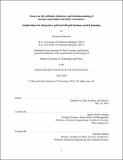| dc.contributor.advisor | Ignacio Pérez-Arriaga. | en_US |
| dc.contributor.author | Rahnama, Roxanne | en_US |
| dc.contributor.other | Technology and Policy Program. | en_US |
| dc.date.accessioned | 2018-09-17T14:49:58Z | |
| dc.date.available | 2018-09-17T14:49:58Z | |
| dc.date.copyright | 2018 | en_US |
| dc.date.issued | 2018 | en_US |
| dc.identifier.uri | http://hdl.handle.net/1721.1/117795 | |
| dc.description | Thesis: S.M. in Technology and Policy, Massachusetts Institute of Technology, School of Engineering, Institute for Data, Systems, and Society, 2018. | en_US |
| dc.description | This electronic version was submitted by the student author. The certified thesis is available in the Institute Archives and Special Collections. | en_US |
| dc.description | Cataloged student-submitted from PDF version of thesis. | en_US |
| dc.description | Includes bibliographical references (pages 116-126). | en_US |
| dc.description.abstract | Electrification rates in a number of low income and developing countries have faced steady improvements in the last few decades, with impressive technological advancements in both the grid and off-grid sectors. There are nonetheless vast swaths of the planet - largely concentrated in India and sub-Saharan Africa - that continue to face troublesome gaps, along both extensive and intensive margins, in progress toward the goal of universal electricity access by 2030. In spite of widespread technical developments, growth of digital platforms for stakeholder engagement, and improvements in technocratic optimization tools for planning, stubborn challenges remain in the distribution sector of LIDCs, placing persistent constraints on equitable growth, private investment, and development for the 1.6 billion rural citizens living in the dark during an era of rapid urbanization. Attaching particular focus to India, which houses 300 million of the global energy poor, this thesis will argue that inadequate attention to consumer attitudes, behavior, and decision-making patterns perpetuates gridlocks in surpassing the final frontiers of global electrification. This overarching argument will be developed over a series of standalone, yet intellectually connected essays that derive from a mixture of applied political economy methods: first, an in-depth context analysis of electricity distribution in India will be introduced. The second essay extends beyond the Indian context and is largely organized as a state-of-knowledge paper that examines the complex relationship between ability-to-pay, willingness-to-pay, and welfare, and the ways in which nuanced socioeconomic, behavioral, and technical dynamics endogenously interact with these variables. In doing so, several hypotheses and case study analyses will be presented and deficiencies in this nascent literature which merit more academic engagement will be highlighted. The ultimate paper will conclude by offering different sets of consumer engagement and behavioral design recommendations that can advance an integrative approach to grid and off-grid business model planning. In holistically examining the complex nexus between electricity access and the consumer psyche, this thesis aims to provide deeper insights into the lives of the energy poor and advance a human-centered design approach to electrification planning in developing contexts. | en_US |
| dc.description.statementofresponsibility | by Roxanne Rahnama. | en_US |
| dc.format.extent | 126 pages | en_US |
| dc.language.iso | eng | en_US |
| dc.publisher | Massachusetts Institute of Technology | en_US |
| dc.rights | MIT theses are protected by copyright. They may be viewed, downloaded, or printed from this source but further reproduction or distribution in any format is prohibited without written permission. | en_US |
| dc.rights.uri | http://dspace.mit.edu/handle/1721.1/7582 | en_US |
| dc.subject | Institute for Data, Systems, and Society. | en_US |
| dc.subject | Engineering Systems Division. | en_US |
| dc.subject | Technology and Policy Program. | en_US |
| dc.title | Essays on the attitudes, behavior, and decision-making of income-constrained electricity consumers : implications for integrative grid and off-grid business model planning | en_US |
| dc.type | Thesis | en_US |
| dc.description.degree | S.M. in Technology and Policy | en_US |
| dc.contributor.department | Massachusetts Institute of Technology. Engineering Systems Division | |
| dc.contributor.department | Massachusetts Institute of Technology. Institute for Data, Systems, and Society | |
| dc.identifier.oclc | 1051222914 | en_US |
